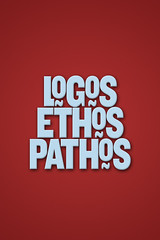| 9512993723 | rhetorical appeals | Rhetorical techniques used to persuade an audience by emphasizing what they find most important or compelling. The three major appeals are the ethos (character), logos (reason), and pathos (emotion). | | 0 |
| 9512993724 | ethos | Greek for "character." Speakers appeal to ethos to demonstrate that they are credible and trustworthy to speak on a given topic. Ethos is established by both who you are and what you say. | | 1 |
| 9512993725 | counterargument | An opposing argument to the one a writer is putting forward. Rather than ignoring a counterargument, a strong writer will usually address it through the process of concession and refutation. | | 2 |
| 9512993726 | concession (concede) | An acknowledgement that an opposing argument may be true or reasonable. In a strong argument, a concession is usually accompanied by a refutation challenging the validity of the opposing argument. | | 3 |
| 9512993727 | refutation (refute) | A denial of the validity of an opposing argument. In order to sound reasonable, refutations often follow a concession that acknowledges that an opposing argument may be true or reasonable. | | 4 |
| 9512993728 | logos | Greek for "embodied thought." Speakers appeal to logos or reason, by offering clear, rational ideas and using specific details, examples, facts, statistics, or expert testimony to back them up. | | 5 |
| 9512993729 | connotation | Meanings or associations that readers have with a word beyond its dictionary definition, or denotation. Words carry cultural and emotional associations or meanings in addition to their literal meanings or denotations. Connotations are usually positive or negative, and they can greatly affect the author's tone. | | 6 |
| 9512993730 | pathos | Greek for "suffering" or "experience." Speakers appeal to pathos to emotionally motivate their audience. More specific appeals to pathos might play on the audience's values, desires, and hopes, on the one hand, or fears and prejudices, on the other. | | 7 |
| 9512993731 | Rhetorical Triangle | A diagram that illustrates the interrelationship among the speaker, audience, and the subject in determining a text. |  | 8 |
| 9512993732 | audience | The listener, viewer, or reader of a text. Most texts are likely to have multiple audiences | | 9 |
| 9512993733 | context | The circumstances, atmosphere, attitudes, and events surrounding a text. | | 10 |
| 9512993734 | occasion | The time and place a speech is given or a piece is written. | | 11 |
| 9512993735 | persona | Greek for "mask." The face or character that a speaker shows to his or her audience. | | 12 |
| 9512993736 | polemic | Greek for "hostile." An aggressive argument that tries to establish the superiority of one opinion over all others. Polemics generally do not concede that opposing opinions have any merit. | | 13 |
| 9512993737 | propaganda | The spread of ideas and information to further a cause. In its negative sense, propaganda is the use of rumors, lies, disinformation, and scare tactics in order to damage or promote a cause. | | 14 |
| 9512993738 | purpose | The goal the speaker wants to achieve. | | 15 |
| 9512993739 | rhetoric | As Aristotle defined the term, "The faculty of observing in any given case the available means of persuasion." In other words, it is the art of finding ways to persuade an audience. | | 16 |
| 9512993740 | SOAPSTone | A mnemonic device that stands for Subject, Occasion, Audience, Purpose, Speaker, and Tone. It is a handy way to remember the various elements that make up the rhetorical situation. | | 17 |
| 9512993741 | speaker | The person or group who creates a text. This might be a politician who delivers a speech, a commentator who writes an article, an artist who draws a political cartoon, or even a company that commissions an advertisement. | | 18 |
| 9512993742 | subject | The topic of a text; what the text is about. | | 19 |
| 9512993743 | text | While this terms generally means the written word, in the humanities it has come to mean any cultural product that can be "read"-meaning not just consumed and comprehended, but investigated. This includes fiction, nonfiction, poetry, political cartoons, fine art, photography, performances, fashion, cultural trends, and much more. | | 20 |
| 9512993744 | diction | The speaker's choice of words. Writers choose words to create and convey a typical mood, tone and atmosphere to their readers. Diction or choice of words separates good writing from bad writing. It depends on a number of factors. Firstly, the word has to be right and accurate. Secondly, words should be appropriate to the context in which they are used. Lastly, the choice of words should be such that the listener or readers understand easily. Besides, proper diction or proper choice of words is important to get the message across. On the contrary, the wrong choice of words can easily divert listeners or readers which results in misinterpretation of the message intended to be conveyed. | | 21 |
| 9512993745 | syntax | How the words are arranged | | 22 |
| 9512993746 | tone | The speaker's attitude toward's the subject as revealed by his or her choice of language | | 23 |
| 9512993747 | mood | How the work makes the reader feel. | | 24 |
| 9512993748 | metaphor | Figure of speech that compares two things without using like or as; says one thing IS another. | | 25 |
| 9512993749 | similes | Figure of speech that compares two things using like or as. | | 26 |
| 9512993750 | personification | Attribution of a human quality to an inanimate object or idea. | | 27 |
| 9512993751 | hyperbole | Exaggerated statements or claims not meant to be taken seriously | | 28 |
| 9512993752 | parallelism | Similarity of structure in a pair or series of related words, phrases, or clauses. | | 29 |
| 9512993753 | juxtaposition | Two or more ideas, places, characters, and their actions are placed side by side in a narrative or a poem, for the purpose of developing comparisons and contrasts. ie: Paradise lost | | 30 |
| 9512993754 | antithesis | Opposition, or contrast, of ideas or words in a parallel construction. | | 31 |
| 9512993755 | compound sentence | A sentence with more than one subject or predicate | | 32 |
| 9512993756 | complex sentence | A sentence containing a subordinate clause or clauses | | 33 |
| 9512993757 | periodic sentence | Sentence whose main clause is withheld until the end. | | 34 |
| 9512993758 | cumulative sentence | Sentence that completes the main idea at the beginning of the sentence and then builds and adds on. | | 35 |
| 9512993759 | imperative sentence | Sentence used to command or enjoin. | | 36 |
| 9512993760 | pacing | How fast a story unfolds. Does the author reveal details quickly or slowly? How does he or she build suspense? | | 37 |
| 9512993761 | figures of speech | A word or phrase used in a nonliteral sense to add rhetorical force to a spoken or written passage | | 38 |
| 9512993762 | zeugma | Use of two different words in a grammatically similar way that produces different, often incongruous meanings. | | 39 |
| 9512993763 | satire | The use of irony or sarcasm to criticize | | 40 |
| 9512993764 | hortative sentence | Sentence that exhorts, urges, entreats, implores, or calls to action. | | 41 |
| 9512993765 | allusion | Brief reference to a person, event, or place (real or fictitious) or to a work of art. | | 42 |
| 9512993766 | archaic diction | Old-fashioned or outdated choice of words. You can use archaic language for many purposes, such as to sound more official, authoritative, or magical. Think Shakespeare, the Bible, classic literature, etc. | | 43 |
| 9512993767 | asyndeton | Omission of conjunctions between coordinate phrases, clauses, or words. | | 44 |
| 9512993768 | inversion | Inverted order of words in a sentence (variation of the subject-verb-object order). Hyperbaton refers to any departure from normal word order (sometimes
called inverted word order).
The unexpected arrangement of words calls sharp attention to the word(s) that are out of their expected
place, thus emphasizing them.
Displacing words to the end or beginning of a sentence (areas ofgreatest emphasis) further stresses
them.
Think Yoda....
Examples:
Disturb me not!
Books they have demanded and books
they will get.
Normal word order: You should attend
first those who need medicine.
Inverted word order: Those who need
medicine you should attend first.
Normal word order: After all the pressure
against it, the law prevailed.
Hyperbatonic word order: The law, after
all the pressure against it, prevailed. | | 45 |
| 9512993769 | oxymoron | Paradoxical juxtaposition of words that seem to contradict one another. The common oxymoron phrase is a combination of an adjective proceeded by a noun with contrasting meanings, such as "cruel kindness," or "living death". It is important to understand the difference between an oxymoron and a paradox. A paradox may consist of a sentence, or even a group of sentences. An oxymoron, on the other hand, is a combination of two contradictory or opposite words. A paradox seems contradictory to the general truth, but it does contain an implied truth. An oxymoron, however, may produce a dramatic effect, but does not make literal sense. | | 46 |
| 9512993770 | rhetorical question | Figure of speech in form of a question posed for the rhetorical effect rather than for the purpose of getting an answer. | | 47 |
| 9512993771 | synecdoche | Figure of speech that uses a part to represent a whole. May also use larger groups to refer to smaller groups, or vice versa. It may also call a thing by the name of the material it is made of, or it may refer to a thing in a container or packaging by the name of that container or packing. Example: The word "bread" refers to food or money, as in "Writing is my bread and butter," or "He is the sole breadwinner."
The phrase "gray beard" refers to an old man.
The word "sails" refers to a whole ship.
The word "suit" refers to a businessman.
The word "boots" usually refers to soldiers.
The term "coke" is a common synecdoche for all carbonated drinks.
"wheels" and "ride" are synecdoches for car
The word "glasses" refers to spectacles. | | 48 |
| 9512993772 | imagery | When a writer describes something using language that appeals to our five senses (sight, smell, taste, touch, hearing) | | 49 |
| 9512993773 | argument | A process of reasoned inquiry; a persuasive discourse resulting in a coherent and considered movement from claim to conclusion. | | 50 |
| 9512993774 | Rogerian Arguments | Developed by psychiatrist Carl Rogers, Rogerian arguments are based on the assumption that having a understanding of an opposing position is essential to responding to it persuasively and refuting it in a way that is accommodating rather than alienating. | | 51 |
| 9512993775 | claim | Also called an assertion or a proposition, a claim states the argument's main idea or position. A claim differs from a topic or subject in that a claim has to be arguable. | | 52 |
| 9512993776 | claim of fact | A claim of fact asserts that something is true or not true. | | 53 |
| 9512993777 | claim of value | A claim of value argues that something is good or bad, right or wrong. | | 54 |
| 9512993778 | claim of policy | A claim of policy proposes a change. | | 55 |
| 9512993779 | closed thesis | A closed thesis is a statement of the main idea of the argument that also previews the major points the writer intends to make. | | 56 |
| 9512993780 | open thesis | An open thesis statement is one that does not list all the points the writer intends to cover in an essay. | | 57 |
| 9512993781 | counterargument thesis | a summary of the counterargument, usually qualified by although or but, precedes the writer's opinion | | 58 |
| 9512993782 | logical fallacy (fallacy) | Logical fallacies are potential vulnerabilities or weaknesses in an argument. They often arise from a failure to make a logical connection between the claim and the evidence used to support it. | | 59 |
| 9512993783 | red herring | When a speaker skips to a new and irrelevant topic in order to avoid the topic of discussion | | 60 |
| 9512993784 | ad hominem | Latin for "to the man," this fallacy refers to the specific diversionary tactic of switching the argument from the issue at hand to the character of the other speaker. If you argue that a park in your community should not be renovated because the person supporting it was arrested during a domestic dispute, then you are guilty of ad hominem. | | 61 |
| 9512993785 | faulty analogy | A fallacy that occurs when an analogy compares two things that are not comparable. For instance, to argue that because we put animals who are in irreversible pain out of their misery, we should do the same for people, asks the reader to ignore significant and profound differences between animals and people. | | 62 |
| 9512993786 | straw man | A fallacy that occurs when a speaker chooses a deliberately poor or oversimplified example in order to ridicule and refute an idea. | | 63 |
| 9512993787 | either/or (false dilemma) | A fallacy in which the speaker presents two extreme options as the only possible choices. | | 64 |
| 9512993788 | hasty generalization | A fallacy in which conclusion is reached because of inadequate evidence. | | 65 |
| 9512993789 | circular reasoning | A fallacy in which the writer repeats the claim as a way to provide evidence. | | 66 |
| 9512993790 | first-hand evidence | Evidence based on something that the writer knows, whether it's from personal experience, observations, or general knowledge of events. | | 67 |
| 9512993791 | second-hand evidence | Evidence that is accessed through research, reading, and investigation. It includes factual and historical information, expert opinion, and quantitative data. | | 68 |
| 9512993792 | post hoc ergo propter hoc | This fallacy is Latin for "after which therefore because of which," meaning that it is incorrect to always claim that something is a clause just because it happened earlier. One may loosely summarize this fallacy by saying that correlation does not simply imply causation. | | 69 |
| 9512993793 | appeal to false authority | This fallacy occurs when someone who has no expertise to speak on a issue is cited as an authority. A TV star, for instance, is not a medical expert, even though pharmaceutical advertisements often use celebrity endorsements. | | 70 |
| 9512993794 | quantitative evidence | Quantitative evidence includes things that can be measured, cited, counted, or otherwise represented in numbers-for instance, statistics, surveys, polls, census information. | | 71 |
| 9512993795 | ad populum (bandwagon appeal) | This fallacy occurs when evidence boils down to "everybody's doing it, so it must be a good thing to do." | | 72 |
| 9512993796 | introduction (exordium) | Introduces the reader to the subject under discussion. | | 73 |
| 9512993797 | narration (narratio) | Provides factual information and background material on the subject at hand or establishes why the subject is a problem that needs addressing. | | 74 |
| 9512993798 | confirmation (confirmatio) | Usually the major part of the text, the confirmation includes the proof needed to make the writer's case. | | 75 |
| 9512993799 | refutation (refutatio) | Addresses the counterargument. It is a bridge between the writer's proof and conclusion. | | 76 |
| 9512993800 | conclusion (peroratio) | Brings the essay to a satisfying close. | | 77 |
| 9512993801 | syllogism | A logical structure that uses the major premise and minor premise to reach a necessary conclusion. | | 78 |
| 9512993802 | induction | From the Latin inducere, "to lead into"; a logical process whereby the writer reasons from particulars to universals, using specific cases in order to draw a conclusion, which is also called generalization. | | 79 |
| 9512993803 | deduction | Deduction is a logical process whereby one reaches a conclusion by starting with a general principal or universal truth (a major premise). The process of deduction usually demonstrated in the form of a syllogism. | | 80 |
| 9512993804 | Toulmin model | An approach to analyzing and constructing arguments created by British philosopher Stephen Toulmin in his book The Uses of Argument (1985). The Toulmin model can be stated as a template:
Because (evidence as support), therefore (claim), since (warrant or assumption), on account of (backing), unless (reservation). | | 81 |
| 9512993805 | warrant | In the Toulmin model, the warrant expresses the assumption necessarily shared by the speaker and the audience. | | 82 |
| 9512993806 | assumption | In the Toulmin model, the warrant expresses the assumption necessarily shared by the speaker and the audience. | | 83 |
| 9512993807 | backing | In the Toulmin model, backing consists of further assurances or data without which the assumption lacks authority. | | 84 |
| 9512993808 | qualifier | In the Toulmin model, the qualifier uses words like usually, probably, maybe, in most cases, and most likely to temper the claim, making it less absolute. | | 85 |
| 9512993809 | reservation | In the Toulmin model, a reservation explains the terms and conditions necessitated by the qualifier. | | 86 |
| 9512993810 | rebuttal | In the Toulmin model, a rebuttal gives voice to possible objections. | | 87 |
| 9512993811 | begging the question | A fallacy in which a claim is based on evidence or support that is in doubt. It "begs" a question whether the support itself is sound. | | 88 |
| 9512993812 | the classical oration | Five-part argument structure used by classical rhetoricians. The five parts are:
-introduction (exordium)
-narration (narratio)
-confirmation (confirmatio)
-refutation (refutatio)
-conclusion (peroratio) | | 89 |
| 9512993813 | syndeton | a sentence style in which words, phrases, or clauses are joined by conjunctions (usually and). | | 90 |
| 9512993814 | qualitative evidence | Descriptive information, which often comes from interviews, focus groups or artistic depictions such as photographs. | | 91 |
| 9512993815 | bias | 1. a prejudiced view (either for or against); a preference.
2. a partiality that prevents objective consideration of an issue or situation | | 92 |
| 9512993816 | Validity (or logically valid) | the fact that the truth of the premises logically guarantees the truth of the conclusion. Whenever the premises are true, the conclusion must be true. | | 93 |
| 9512993817 | scare tactics | using fear to sway people by exaggerating possible dangers well beyond their statistical likelihood | | 94 |
| 9512993818 | slippery slope | Suggest dire consequences from relatively minor causes | | 95 |
| 9512993819 | dogmatism | shuts down discussion by asserting that the writer's beliefs are the only acceptable ones | | 96 |
| 9512993820 | equivocation | the use of ambiguous language to conceal the truth or to avoid committing oneself; it is a half truth | | 97 |
| 9512993821 | non sequitur | a statement that does not follow logically from evidence | | 98 |
| 9512993822 | undistributed middle | is a formal fallacy that is committed when the middle term in a categorical syllogism is not distributed in either the minor premise or the major premise.
Pattern: All Z is B
All Y is B
Therefore, all Y is Z
B is the common term between the two premises (the middle term) but is never distributed, so this syllogism is invalid.
eg: All students carry backpacks.
My grandfather carries a backpack.
Therefore, my grandfather is a student. | | 99 |
| 9512993823 | isocolon | a rhetorical device that involves a succession of sentences, phrases, and clauses of grammatically equal length. In this figure of speech, a sentence has a parallel structure that is made up of words, clauses, or phrases of equal length, sound, meter, and rhythm. Isocolon is the repetition of similar grammatical forms. | | 100 |
| 9512993824 | chiasmus | a rhetorical device in which two or more clauses are balanced against each other by the reversal of their structures in order to produce an artistic effect. | | 101 |
| 9512993825 | antimetabole | a literary term or device that involves repeating a phrase in reverse order. For example:
"You like it; it likes you."
"Fair is foul and foul is fair." | | 102 |
| 9512993826 | anaphora | Repetition of a word or phrase at the beginning of successive phrases, clauses, or lines.
This device produces a strong emotional effect, especially in speech. It also establishes a marked change in rhythm.
a. "We shall not flag or fail. We shall go on to the end. We shall fight in France, we shall fight on the seas and oceans, we shall fight with growing confidence and growing strength in the air, we shall defend our island . . . we shall never surrender." (Winston Churchill, 1940)
b. "Why should white people be running all the stores in our community? Why should white people be running the banks of our community? Why should the economy of our community be in the hands of the white man? Why?" (Malcolm X)
c. "Yesterday, the Japanese government also launched an attack against Malaya. Last night, Japanese forces attacked Hong Kong. Last night, Japanese forces attacked Guam. Last night, Japanese forces attacked the Philippine Islands. Last night, the Japanese attacked Wake Island. And this morning, the Japanese attacked Midway Island." (Franklin Roosevelt, Pearl Harbor Address) | | 103 |
| 9512993827 | epistrophe | repetition of the same word or group of words at the ends of successive phrases. Like anaphora, epistrophe produces a strong rhythm and emphasis.
a. "But to all of those who would be tempted by weakness, let us leave no doubt that we will be as strong as we need to be for as long as we need to be." (Richard Nixon, First Inaugural Address)
b. "...and that government of the people, by the people, for the people shall not perish from the earth." (Abraham Lincoln, Gettysburg Address)
c. "As long as the white man sent you to Korea, you bled. He sent you to Germany, you bled. He sent you to the South Pacific to fight the Japanese, you bled." (Speech by Malcolm X)
d. "In a cake, nothing tastes like real butter, nothing moistens like real butter, nothing enriches like real butter, nothing satisfies like real butter." (Caption from a Pillsbury ad) | | 104 |
| 9512993828 | epanalepsis | (eh-puh-nuh-LEAP-siss) — repetition of the same word or words at both beginning and ending of a phrase, clause, or sentence. Like other schemes of repetition, epanalepsis often produces or expresses strong emotion.
a. Blood hath bought blood, and blows have answer'd blows:/ Strength match'd with strength, and power confronted power. (William Shakespeare, King John)
b. "Nothing is worse than doing nothing."
c. "A minimum wage that is not a livable wage can never be a minimum wage." (Ralph Nader) | | 105 |
| 9512993829 | anadiplosis | (an-uh-dih-PLO-sis) — repetition of the last word of one clause at the beginning of the following clause.
a. "The crime was common, common be the pain". (Alexander Pope, "Eloise to Abelard"
b. "Aboard my ship, excellent performance is standard. Standard performance is sub-standard. Sub-standard performance is not permitted to exist." (Captain Queeg, Herman Wouk's The Caine Mutiny)
c. "Somehow, with the benefit of little formal education, my grandparents recognized the inexorable downward spiral of conduct outside the guardrails: If you lie, you will cheat; if you cheat, you will steal; if you steal, you will kill." (Justice Clarence Thomas, 1993 Mercer Law School Address)
d. "They call for you: The general who became a slave; the slave who became a gladiator; the gladiator who defied an Emperor. Striking story." (line delivered by Joaquin Phoenix, from the movie Gladiator) | | 106 |
| 9512993830 | polyptoton | (po-lyp-TO-ton) — repetition of words derived from the same root.
a. "But in this desert country they may see the land being rendered useless by overuse." (Joseph Wood Krutch, The Voice of the Desert)
b. "We would like to contain the uncontainable future in a glass." (Loren Eiseley, from an article in Harper's, March 1964)
c. "With eager feeding food doth choke the feeder." (Shakespeare's Richard II 2.1.37)
d. "Let me assert my firm belief that the only thing we have to fear is fear itself." (Franklin
Roosevelt, First Inaugural Address, March 1933) | | 107 |
| 9512993831 | alliteration | repetition in which a number of words, having the same first consonant sound, occur close together in a series. Alliteration does not depend on letters but on sounds. So the phrase not knotty is alliterative, but cigarette chase is not.
a. "The fair breeze blew, the white foam flew,
The furrow followed free" Samuel Taylor Coolridge
b. "It was the meanest moment of eternity". (Zora Neale Hurston, Their Eyes Were Watching God)
c. "His soul swooned slowly as he heard the snow falling faintly through the universe and faintly falling, like the descent of their last end, upon all the living and the dead." (James Joyce,The Dead)
d. Names, logos, and ads are often alliterative because it helps you remember: Dunkin' Donuts
PayPal; Best Buy;Coca-Cola; Lois Lane; Sammy Sosa; Ronald Reagan; Porky Pig; etc. | | 108 |
| 9512993832 | assonance | the repetition of similar vowel sounds, preceded and followed by different consonants, in the stressed syllables of adjacent words.
a. "Whales in the wake like capes and Alps/ Quaked the sick sea and snouted deep."
(Dylan Thomas, "Ballad of the Long Legged Bait")
b. "Refresh your zest for living." (advertisement for French Line Ships)
c. "Strips of tinfoil winking like people." (Sylvia Plath)
d. "The gloves didn't fit. If it doesn't fit, you must acquit." (Johnny Cochran, O.J.Simpson trial) | | 109 |
| 9512993833 | consonance | The use of a series of consonants in quick succession - used more in poetry than in prose.
a. "The pitter patter of perpetual precipitation put me in a petulant mood".
While there is alliteration in this sentence with the letter p being repeated in the beginning of words, the repeated p and t are consonant.
b. "Rap rejects my tape deck, ejects projectile
Whether Jew or gentile, I rank top percentile
Many styles, more powerful than gamma rays
My grammar pays, like Carlos Santana plays." | | 110 |
| 9512993834 | homoioptoton | The repetition of similar case endings in adjacent words or in words in parallel position.
We commonly refer to this simply as "rhyme." | | 111 |
| 9512993835 | ellipsis | Ellipsis is the omission of a word or series of words. There are two slightly different definitions of ellipsis which are pertinent to literature. The first definition of ellipsis is the commonly used series of three dots, which can be place at the beginning, in the middle, or at the end of a sentence or clause. But more importantly, for AP purposes, the second is: a linguistically appropriate omission of words that are mutually understood and thus unnecessary. This type of ellipsis is usually used where the words omitted would be redundant.
example:
Gapping: I ordered the linguine, and he [ordered] the lobster.
Stripping: I ordered the linguine, [I did] not [order] lobster.
Verb phrase ellipsis: I'll order the linguine and you can [order the linguine], too.
Answer ellipsis: Who ordered the linguine? I did [order the linguine].
Sluicing: I'll get something to drink, but I'm not sure what [I'll get to drink].
Nominal ellipsis: I ordered two drinks, and Bill [ordered] one. | | 112 |
| 9512993836 | metonymy | a type of metaphor where the substitution of the name of an attribute for that of the thing meant.
Examples:
The pen is mightier than the sword. -Edward Bulwer-Lytton
This land belongs to the crown.
Flight simulators are valuable because you can die in software and still be around to fly another day.
You cannot fight city hall.
The orders came directly from the White House.
After four years of reading and writing, I got my bachelor's degree and left college.
After four years of filling in the bubbles on machine-scored answer sheets, I got my bachelor's degree and left college. | | 113 |
| 9512993837 | parenthesis | a stylistic device that comes from the Greek word meaning "to place," or "alongside." Parenthesis is a qualifying or explanatory sentence, clause, or word that writers insert into a paragraph or passage. However, if they leave it out, even then it does not grammatically affect the text, which is correct without it.
Parenthesis makes the statements more convincing, as it puts the readers in a right form from the very beginning where they read it as an explanation. However, its main function is to give more explanation and add emphasis, while its repeated use can cause focus and thus makes parenthetical insertions a dominant feature of a sentence.
Parenthesis also offers readers an insight into true feelings and opinions of characters and narrators, while they might tend to evade parenthetical information as unimportant. Doing this, parenthesis could leave them clueless to the actual purpose of a sentence. In addition, it often creates humorous effect by using hyperbole and understatements. | | 114 |
| 9512993838 | paradox | an apparently contradictory statement that actually contains some truth.
examples:
Less is more
You can save money by spending it.
I know one thing; that I know nothing.
This is the beginning of the end.
Deep down, you're really shallow.
I'm a compulsive liar.
"Men work together whether they work together or apart." - Robert Frost
"What a pity that youth must be wasted on the young." - George Bernard Shaw
"I can resist anything but temptation." - Oscar Wilde
Here are the rules: Ignore all rules.
The second sentence is false. The first sentence is true. | | 115 |


















































































































































































































































